
Two-Thirds of Russians Support Dima Yakovlev Law
(Russia) on 7 December 2015
by Ivan Buranov (link to original)
The percentage of Russians who support the Dima Yakovlev Law, which bans adoptions of Russian children by Americans, grew from 54 percent to 76 percent during the last three years. It is evident from newly released statistics compiled by the Russian Public Opinion Research Center, known as VTsIOM. At the same time, the number of Russians who are ready to adopt a child themselves grew from 11 percent to 20 percent, a majority of whom were from Moscow and St. Petersburg, and people with a high level of personal income.
VTsIOM published the research data, the purpose of which was to study the perception of the Dima Yakovlev Law (which took effect on Jan. 1, 2013) by Russians. Public opinion surveys were taken in 130 cities in Russia (including 1,600 respondents) and showed that Russians have changed their mind about this subject. In Jan. 2013, 54 percent of Russians supported the new child adoption rules, but 76 percent supports the rules now. The number of opponents to the law decreased from 21 percent to 19 percent. Noticeably more people now have a clear opinion on the subject: In 2013, 25 percent of Russians did not have a clear opinion about the Dima Yakovlev Law, but now that number has dropped to five percent.
In addition, sociologists asked the question: “Will you or members of your family adopt a child?” Some 75 percent of respondents answered "No, we're not going to do that,” whereas in 2013, 83 percent of respondents answered no. Some 11 percent of respondents admitted that they would not rule out such a possibility, compared to 6 percent in 2013. Six percent stated they were ready to adopt a child, compared to 4 percent in 2013. People who responded this way most often were 25-34-year-olds (34 percent), people from Moscow and St. Petersburg (29 percent), people with high incomes (27 percent) and people with higher education (27 percent). One percent of the respondents said they have already adopted a child.
Some 67 percent answered no (compared to 72 percent in 2013) and 26 percent answered yes (compared to 21 percent in 2013) to the question: "Have any of your friends and relatives adopted children?” Six percent of those asked replied, “I am not aware of it; maybe." In addition, the VTsIOM studied the number of references to the Dima Yakovlev Law on the Internet, using the data of Medialogia.* In 2012, this issue was mentioned in the mass media more than 11,000 times; in 2013, about 20,000 times, and in 2015, only 2,500 times.
Let us recall that two-year-old Dima Yakovlev, who was adopted by an American family, died in 2008 due to the fact that the adoptive father left him in a car in the sun for an entire day. As a result, the law prohibiting U.S. citizens from adopting Russian children was passed. The drafting and enactment of this law was accompanied by widespread public discussion. Many people perceived the law not as a way of securing Russian children but rather as a response to the Magnitsky Act, which was passed in the United States. One of the problems with the Dima Yakovlev Law was the fact that at the time this law took effect, about 200 Russian children had already met prospective adoptive parents and were awaiting adoption, as reported by Kommersant. Minister of Education and Science Dmitry Livanov, Minister for Open Government Affairs Michael Abizov and Russian Foreign Minister Sergei Lavrov publicly advocated against this law.
*Editor's note: Medialogia is Russia’s first automated real-time media monitoring and analysis system.
